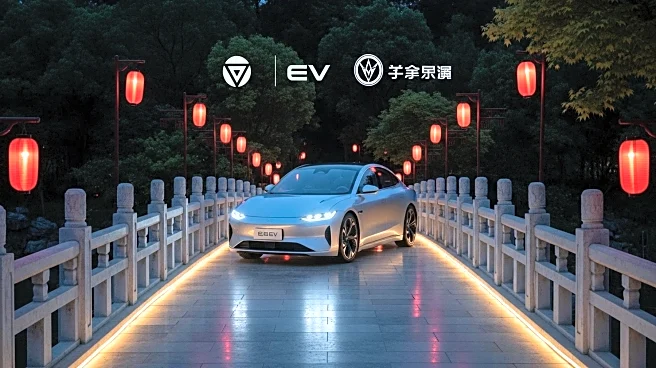What's Happening?
Tesla is experiencing significant challenges in the Chinese electric vehicle (EV) market, as local manufacturers like BYD continue to gain ground. In the second quarter of 2025, Tesla reported an 11.7% decline in sales in China, contrasting sharply with BYD's 11% global sales growth. Despite a modest 0.8% year-on-year increase in June 2025, Tesla's performance was overshadowed by BYD's sale of 377,628 units during the same period. The competitive edge of Chinese automakers is bolstered by their diverse product offerings, including battery-electric vehicles (BEVs) and plug-in hybrids (PHEVs), which appeal to price-sensitive consumers. Tesla's focus on premium models like the Model 3 and Model Y has left it vulnerable in a market where affordability and variety are crucial.
Why It's Important?
The shift in market dynamics in China is significant for Tesla and the broader EV industry. Chinese automakers are leveraging aggressive pricing strategies, government support, and product diversity to capture market share, challenging Tesla's dominance. This trend highlights the importance of adaptability and scale in the EV sector, as local brands not only dominate the domestic market but also expand globally. For Tesla, this situation underscores the need to recalibrate its strategy, potentially by diversifying its product range and enhancing local partnerships. The evolving competitive landscape could redefine the global EV market, impacting investors and stakeholders who have traditionally relied on Tesla's market leadership.
What's Next?
Tesla may need to consider strategic adjustments to regain its competitive edge in China. This could involve expanding its product lineup to include more affordable models and accelerating AI integration to meet consumer expectations. The company might also deepen local partnerships to better align with market demands. However, the window for these changes is narrowing as Chinese automakers continue to strengthen their positions both domestically and internationally. The ongoing developments could lead to a reordering of the EV industry, with Chinese brands potentially emerging as global leaders.
Beyond the Headlines
The rise of Chinese EV brands is supported by deliberate policy and market dynamics, including government subsidies and infrastructure investments. These factors have created a conducive environment for domestic innovation, allowing Chinese automakers to diversify their offerings and reduce reliance on global supply chains. The strategic expansion of Chinese brands into international markets mirrors the approach of tech giants like Huawei, indicating a potential long-term shift in the global EV landscape. Investors must consider these structural forces as they assess the future of the industry.









